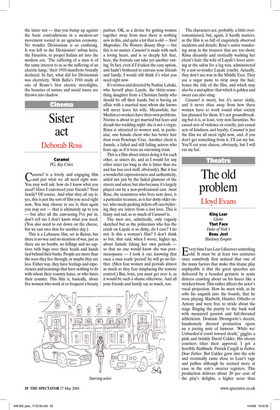Sister act
Deborah Ross
Caramel PG, Key Cities
Caramel is a lovely and engaging film and just what we all need right now. You may well ask: how do I know what you need? Have I canvassed your friends? Your family? Of course. And what they all say is: yes, this is just the sort of film you need right now. You may choose to see it, then again you may not — that is ultimately up to you — but after all the canvassing I’ve put in, don’t tell me I don’t know what you need. (You also need to cut down on the cheese, but we can save that for another day.) This is a Lebanese film, set in Beirut, but there is no war and no mention of war, just as there are no bombs, no killings and no captives with bags over their heads and hands tied behind their backs. People are more than the wars they live through, or maybe they are less. Either way, they have feelings and experiences and yearnings that have nothing to do with whom their country hates, or who hates their country. This film is, basically, about five women who work at or frequent a beauty parlour. OK, as a device for getting women together away from men there is nothing new in this, and quite a lot that is old — Steel Magnolias; The Women; Beauty Shop — but this is no matter. Caramel is made with such a loving heart, and is so deeply felt that, here, the formula can take yet another outing. In fact, even if I’d taken the easy option, and hadn’t bothered to canvass your friends and family, I would still think it’s what you need right now.
It’s written and directed by Nadine Labaki, who herself plays Layale, the thirty-something daughter from a Christian family who should be off their hands, but is having an affair with a married man whom she knows will never leave his wife. Meanwhile, her Muslim co-workers have their own problems. Nisrine is about to get married but fears and dreads her wedding night: she is not a virgin. Rima is attracted to women and, in particular, one female client who has better hair than even Penelope Cruz. Another client is Jamale, a failed and still failing actress who fears age as if it were an oncoming train.
This is a film about sisters doing it for each other, as sisters do, and as I would for any other sister (so long as she is fatter than me and has less cool stuff, obviously). But it has a wonderful expressiveness and authenticity, aided not just by the faded glamour of the streets and salon, but also because it’s largely played out by a non-professional cast. Aunt Rose, the seamstress who lives next door, is a particular treasure, as is her dotty older sister, who steals parking tickets off cars believing they are letters from a lost love. This is funny and sad, as so much of Caramel is.
The men are, admittedly, only vaguely sketched but as the policeman who has the crush on Layale is so dishy, do I care? I do not. Is this a woman’s film? I don’t think so but, that said, when I wrote, higher up, about Jamale faking her own periods — so that no one would know she was postmenopause — I took it out, knowing that once a man reads ‘period’ he will go no further. (Men fear women and periods almost as much as they fear misplacing the remote control.) But, boys, you must get over it, as it would be such a shame otherwise. And all your friends and family say as much, too. The characters are, probably, a little overromanticised, but, again, it hardly matters, as the film is so full of exquisitely observed incidents and details: Rose’s suitor wandering away in the trousers that are too short; Rima dreamily and erotically washing her client’s hair; the wife of Layale’s lover arriving at the salon for a leg wax, administered by a not-so-tender Layale (ouch). Actually, they don’t use wax in the Middle East. They use a sugar paste to strip away the hair, hence the title of the film, and which may also be a metaphor: that which is golden and sweet can also sting.
Caramel is sweet, but it’s never sickly, and it never shies away from how these women have to work round what society has planned for them. It’s not groundbreaking but it is, at least, very non-Tarantino. No casual acts of violence or cruelty, just casual acts of kindness and loyalty. Caramel is just the film we all need right now, and, if you don’t get something from it, I’ll eat my hat. You’ll eat your cheese, obviously, but I will eat my hat.










































































 Previous page
Previous page